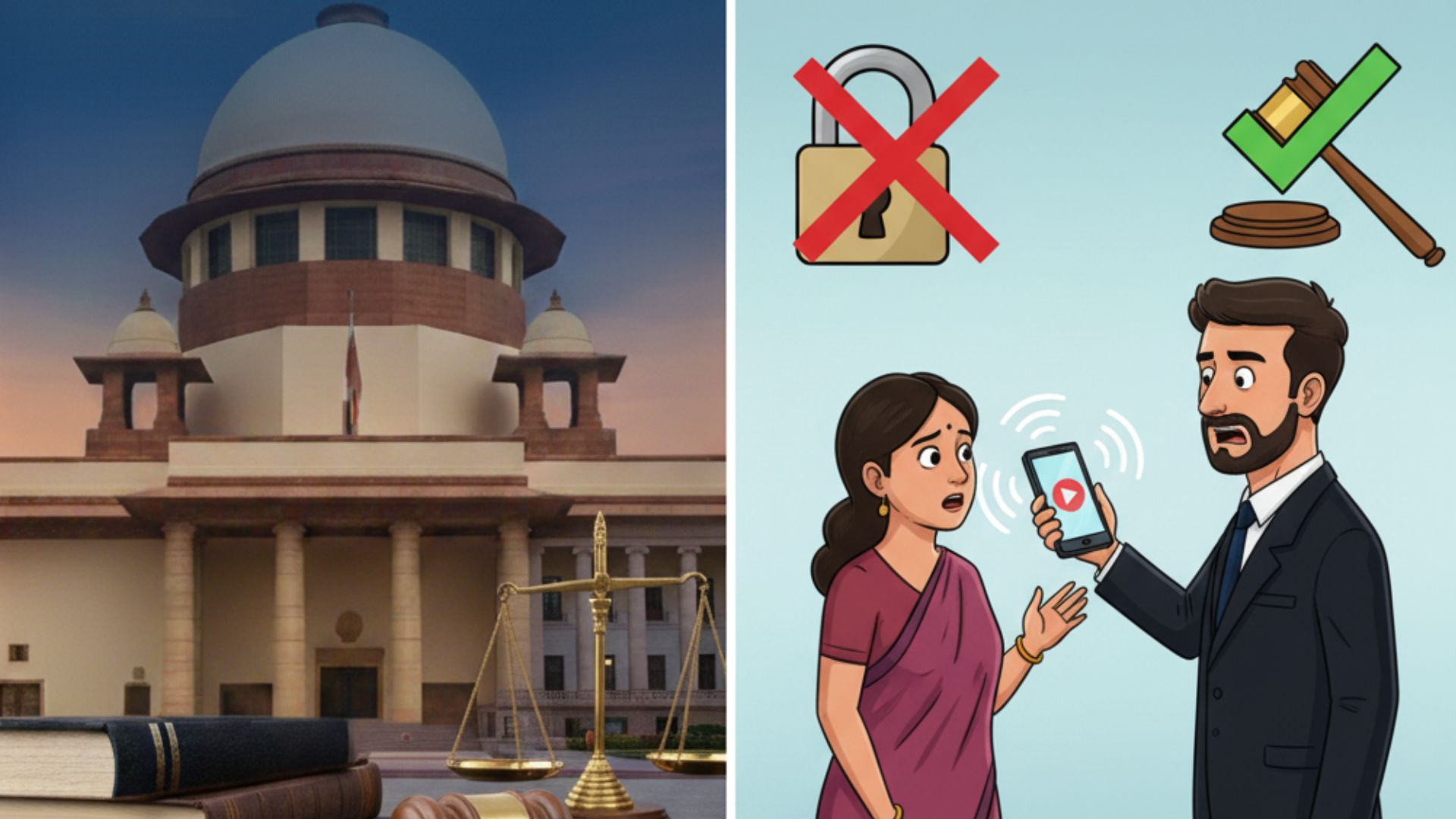 Supreme Court Allows Secretly Recorded Spousal Calls as Evidence in Divorce Cases: Privacy vs Fair Trial Debate
Supreme Court Allows Secretly Recorded Spousal Calls as Evidence in Divorce Cases: Privacy vs Fair Trial Debate
Landmark ruling overturns High Court decision, clarifies Section 122 of Evidence Act
Judges say right to fair trial outweighs privacy in matrimonial disputes
By Our Legal Correspondent
New Delhi: October 04, 2025:
In a landmark judgment that could reshape matrimonial litigation in India, the Supreme Court has ruled that secretly recorded phone conversations between spouses can be admitted as evidence in divorce proceedings. The decision, delivered on 14 July 2025, overturns a Punjab and Haryana High Court ruling that had earlier barred such evidence on the grounds of violating the right to privacy.
The apex court clarified that Section 122 of the Indian Evidence Act, 1872 allows such recordings to be used in cases between married partners, emphasizing that the right to a fair trial must take precedence over privacy concerns in this specific context.
Background of the Case
The case involved a couple married in 2009, who later had a daughter in 2011. Due to ongoing marital disputes, the husband filed for divorce in 2017 under Section 13 of the Hindu Marriage Act, citing cruelty.
During the proceedings, the husband sought to submit memory cards, CDs, and transcripts of phone conversations with his wife, recorded between 2010 and 2016, without her knowledge. He argued that these recordings were crucial to prove his claims of mental cruelty.
The wife opposed the move, arguing that the recordings violated her fundamental right to privacy and should not be admitted as evidence. The Punjab and Haryana High Court agreed with her and dismissed the husband’s application.
However, the husband appealed to the Supreme Court, which has now reversed the High Court’s decision.
Supreme Court’s Reasoning
The bench, led by Justice B.V. Nagarathna and Justice S.C. Sharma, held that while spousal communications are generally privileged under Section 122 of the Evidence Act, there are two key exceptions:
- Cases between married persons (such as divorce proceedings)
- Cases where one spouse is prosecuted for a crime against the other
The Court emphasized that in matrimonial disputes, the privilege of confidentiality does not apply. Instead, the truth-seeking function of the court and the right to a fair trial under Article 21 of the Constitution take priority.
The judgment stated:
“We do not think there is any breach of privacy in this case. Section 122 of the Evidence Act does not recognise such a right. On the contrary, it carves out an exception to the right to privacy between spouses.”
Privacy vs Fair Trial
The ruling has reignited debate on the balance between privacy rights and the need for justice.
- The Court acknowledged that the right to privacy is a fundamental right, as recognized in the landmark Puttaswamy judgment (2017).
- However, it clarified that no fundamental right is absolute. When privacy clashes with the right to a fair trial, the latter must prevail.
The judges also dismissed concerns that the ruling would encourage “snooping” in marriages. They observed that if spouses are already secretly recording each other, it is a symptom of a broken relationship, not the cause.
Safeguards and Conditions
The Supreme Court also laid down safeguards to prevent misuse:
- Recordings must comply with Section 65B of the Evidence Act, which governs electronic evidence.
- Courts may conduct in-camera proceedings to protect sensitive details.
- The evidence must be relevant, authentic, and accurate.
This ensures that while such recordings are admissible, they cannot be used recklessly or without proper verification.
Wider Implications
The ruling has far-reaching implications:
- Matrimonial Disputes: Spouses may increasingly rely on electronic evidence, including call recordings, chats, and emails, to support their claims.
- Privacy Concerns: Critics argue that the judgment weakens the privacy rights of individuals within marriage.
- Legal Precedent: The decision harmonizes earlier rulings, such as Yusufalli Nagree v. State of Maharashtra and R.M. Malkani v. State of Maharashtra, which held that illegally obtained evidence is not automatically inadmissible if it is relevant.
- Technology in Litigation: With smartphones and digital devices becoming central to daily life, courts are increasingly confronted with questions about the admissibility of electronic evidence.
Public Debate
The ruling has sparked mixed reactions among the public:
- Supporters argue that it strengthens the ability of victims—especially in cases of cruelty or abuse—to prove their claims.
- Critics fear it could normalize surveillance within marriages, eroding trust and intimacy.
Some women’s rights groups have expressed concern that the ruling could disproportionately affect women, who may be more vulnerable to covert monitoring.
Conclusion
The Supreme Court’s decision marks a turning point in Indian matrimonial law, tilting the balance in favor of fair trial rights over privacy claims in divorce cases.
While the judgment provides clarity on the admissibility of secretly recorded spousal conversations, it also raises important ethical and social questions about trust, surveillance, and the boundaries of marital privacy.
As technology continues to blur the lines between private and public life, courts will likely face more such dilemmas in the future. For now, the ruling stands as a reminder that in the eyes of the law, the pursuit of truth in court outweighs the sanctity of private conversations between spouses.
ALSO READ POPULAR ARTICLES
-
SC Quashes Rape Case on False Marriage Promise, Terms It ‘Vengeance’
-
SC: Legal Heirs Can Claim Compensation Despite Unrelated Death
-
Allahabad HC: Wife Can Claim Maintenance from Minor Husband at 18
-
Supreme Court Directs Day-to-Day Hearings in Rape and Sensitive Cases
-
SC Upholds FIR Quashing for DM Gaming in Karnataka Poker Case
-
Delhi HC Seeks Uniform Civil Code, Flags Child Marriage Law Clash
-
SC Orders Builder to Refund ₹43 Lakh + 18% Interest for Delay
-
Delhi HC Warns Against Misuse of Section 498A in Matrimonial Cases
-
Karnataka HC Rejects X Corp’s Plea Against Govt Takedown Orders